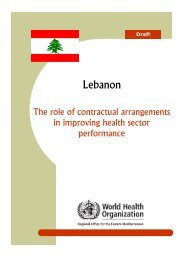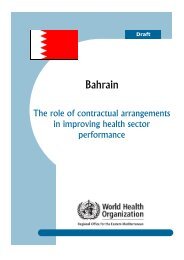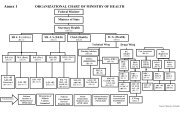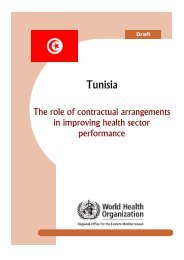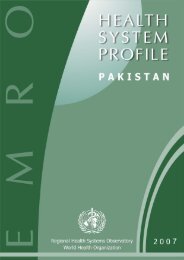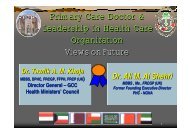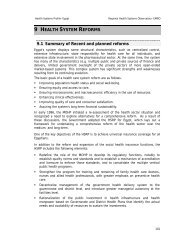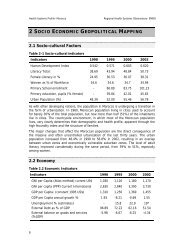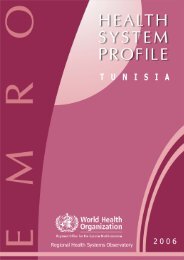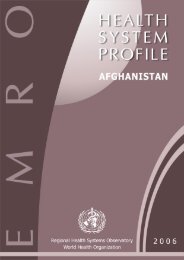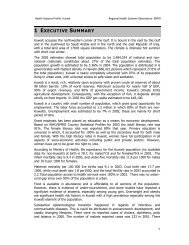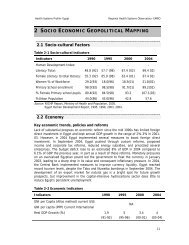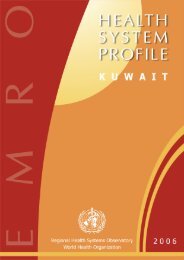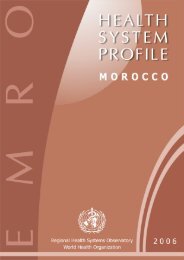Social determinants of health in countries in conflict - What is GIS ...
Social determinants of health in countries in conflict - What is GIS ...
Social determinants of health in countries in conflict - What is GIS ...
You also want an ePaper? Increase the reach of your titles
YUMPU automatically turns print PDFs into web optimized ePapers that Google loves.
<strong>Social</strong> <strong>determ<strong>in</strong>ants</strong> <strong>of</strong> <strong>health</strong> <strong>in</strong> <strong>countries</strong> <strong>in</strong> <strong>conflict</strong> 53<br />
improve the M<strong>in</strong><strong>is</strong>try’s ability to <strong>in</strong>fluence policy-makers and deliver a susta<strong>in</strong>able and<br />
equitable service delivery system <strong>in</strong> more peaceful times [121].<br />
Where many <strong>health</strong> facilities have been destroyed or severely damaged, and many<br />
<strong>health</strong> staff have fled, it <strong>is</strong> essential to rebuild and refurb<strong>is</strong>h facilities and ensure that<br />
they are staffed by tra<strong>in</strong>ed <strong>health</strong> workers. Regional Office technical support to nurses,<br />
midwives and other cadres, <strong>in</strong> collaboration with partners, <strong>in</strong>cludes support for <strong>in</strong>stitutes<br />
<strong>of</strong> <strong>health</strong> sciences and nurs<strong>in</strong>g/midwifery <strong>in</strong> Somalia, Afghan<strong>is</strong>tan and Sudan, plans <strong>of</strong><br />
action on nurs<strong>in</strong>g and midwifery <strong>in</strong> Iraq and Somalia, and curriculum development <strong>in</strong><br />
Afghan<strong>is</strong>tan and Somalia.<br />
In Somalia, the Regional Office <strong>is</strong> support<strong>in</strong>g collaborative programmes to<br />
strengthen nurs<strong>in</strong>g schools to provide nurses and midwives for all three zones <strong>of</strong><br />
Somalia: <strong>in</strong> Bossaso, Mogad<strong>is</strong>hu, and Garawe and at the Institute <strong>of</strong> Health Sciences <strong>in</strong><br />
Harge<strong>is</strong>a. The need for such services was illustrated by a May 2007 assessment <strong>in</strong> the<br />
Sanaag Region which found that most <strong>health</strong> posts were closed except for those run by<br />
the Somali Red Crescent Society; the last tra<strong>in</strong><strong>in</strong>g <strong>of</strong> tra<strong>in</strong>ed birth attendants took place<br />
5 years ago; and all deliveries took place at home with unskilled birth attendants [122].<br />
In Afghan<strong>is</strong>tan, technical support <strong>is</strong> be<strong>in</strong>g provided to <strong>in</strong>stitutes <strong>of</strong> <strong>health</strong> sciences and<br />
the community midwifery programme. Currently, there <strong>is</strong> a serious shortage <strong>of</strong> female<br />
<strong>health</strong> workers due to security problems and restrictions on women's education and work;<br />
as <strong>of</strong> July 2006, 90% <strong>of</strong> tra<strong>in</strong>ee nurses were male [123].<br />
The north-west zone <strong>of</strong> Somalia <strong>is</strong> mak<strong>in</strong>g an attempt to rebuild the <strong>health</strong> system<br />
follow<strong>in</strong>g widespread destruction <strong>of</strong> <strong>health</strong> facilities and mass migration or death <strong>of</strong> <strong>health</strong><br />
workers. International l<strong>in</strong>kages, specifically with <strong>in</strong>stitutions <strong>in</strong> the United K<strong>in</strong>gdom,<br />
support rebuild<strong>in</strong>g facilities, staff<strong>in</strong>g and especially pr<strong>of</strong>essional education [124]. Th<strong>is</strong><br />
effort <strong>is</strong> quoted as a “rare success story <strong>of</strong> post-<strong>conflict</strong> reconstruction” [125].<br />
In the West Bank areas affected by the separation wall, as <strong>of</strong> early 2005 (before the<br />
cr<strong>is</strong><strong>is</strong> <strong>of</strong> 2006), mobile cl<strong>in</strong>ics operated jo<strong>in</strong>tly by the M<strong>in</strong><strong>is</strong>try <strong>of</strong> Health and UNRWA<br />
provided the full package <strong>of</strong> primary <strong>health</strong> care services, <strong>in</strong>clud<strong>in</strong>g vacc<strong>in</strong>ation,<br />
antenatal care and care for chronically-ill people. These cl<strong>in</strong>ics were part <strong>of</strong> the<br />
emergency response project and became more important after the extension <strong>of</strong> closures<br />
and the construction <strong>of</strong> the separation wall. In early 2005, these cl<strong>in</strong>ics served more than<br />
26 000 beneficiaries <strong>in</strong> 135 remote locations, reduc<strong>in</strong>g the percentage <strong>of</strong> the population<br />
not receiv<strong>in</strong>g <strong>health</strong> care from 70% to 50%. Funds and coord<strong>in</strong>ation provided by the<br />
European Union and European Comm<strong>is</strong>sion Humanitarian Office (ECHO) were crucial<br />
<strong>in</strong> support<strong>in</strong>g th<strong>is</strong> system <strong>of</strong> mobile cl<strong>in</strong>ics. Accord<strong>in</strong>g to the Palest<strong>in</strong>ian civil society<br />
report: “Mobile cl<strong>in</strong>ics represent a success story <strong>in</strong> coord<strong>in</strong>ation, resource use and human<br />
<strong>in</strong>tention, as mobile cl<strong>in</strong>ic staff put their lives at r<strong>is</strong>k to serve the Palest<strong>in</strong>ian population<br />
and provide it with the opportunity to live a <strong>health</strong>y life.”<br />
SDH-chapters-<strong>countries</strong> <strong>in</strong> <strong>conflict</strong>-7 Oct.<strong>in</strong>dd 53 08/10/2008 14:24:53



